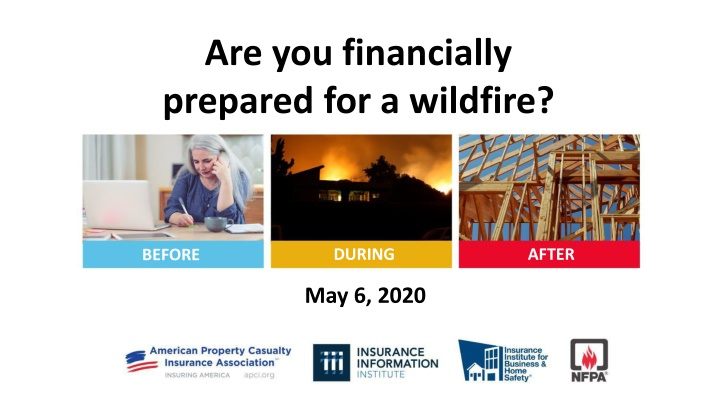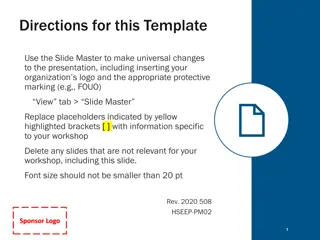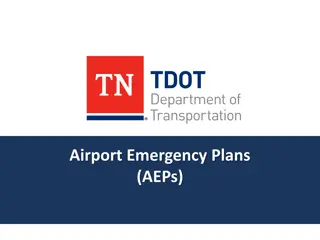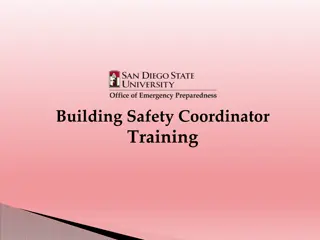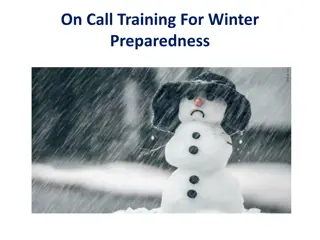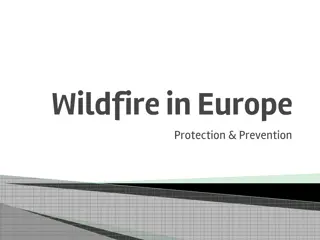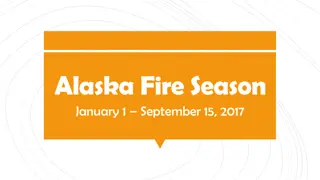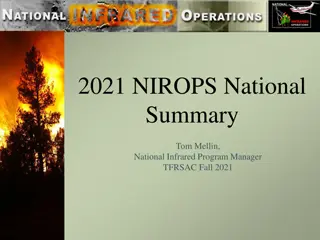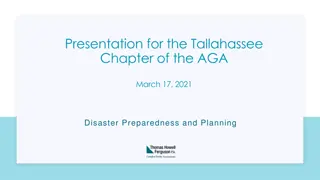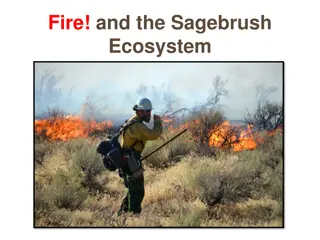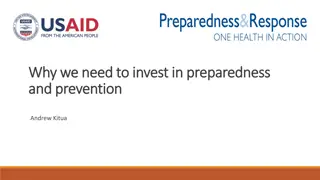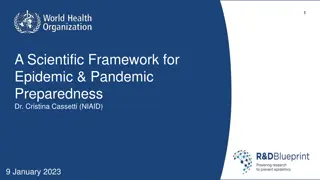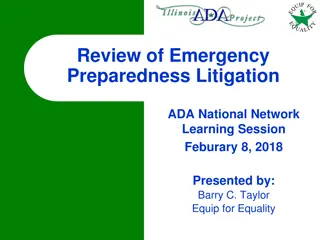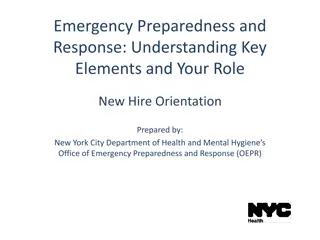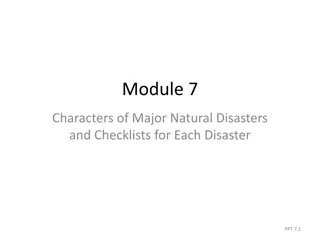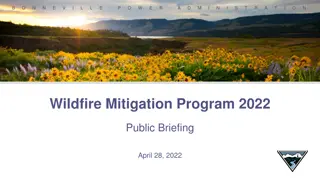Financial Preparedness for Wildfires: Tips and Insights
Partnerships in wildfire preparation, insurance risk assessment, underwriting decisions, policy understanding, and coverage types are crucial for financial readiness during, after, and before wildfire events. Understand your insurance policy to ensure adequate protection against potential risks.
Download Presentation

Please find below an Image/Link to download the presentation.
The content on the website is provided AS IS for your information and personal use only. It may not be sold, licensed, or shared on other websites without obtaining consent from the author.If you encounter any issues during the download, it is possible that the publisher has removed the file from their server.
You are allowed to download the files provided on this website for personal or commercial use, subject to the condition that they are used lawfully. All files are the property of their respective owners.
The content on the website is provided AS IS for your information and personal use only. It may not be sold, licensed, or shared on other websites without obtaining consent from the author.
E N D
Presentation Transcript
Are you financially prepared for a wildfire? DURING AFTER BEFORE May 6, 2020
Partners in Wildfire Prep: Working Together to Prepare & Rebuild After Wildfire NEXT Webinar Coming on May 20, 2020
How Do Insurers Assess the Risk of My Home? You WANT Insurers to Understand Your Risk Insurers have access to property information Technology is sophisticated WUI property on-site inspections
What do Insurance Companies Consider in Underwriting Decisions? Underwriting & rating factors include loss history, age of home, size, construction type and quality, contents, business in the home, foundation WUI risk: location, construction, mitigation, slope, access, proximity & quality, fire protection, etc. It s NOT just the WUI risk that determines insurability & rates
Do all insurance companies use the same underwriting guidelines? Insurers have their own proprietary underwriting & rating guidelines Consider & insure common risk factors, competitive differences are good for consumers, what type of insurance do YOU want to purchase?
Do You Understand Your Insurance Policy? HOMEOWNERS INSURANCE does NOT cover flood, landslide or earthquake damage covers wind, rain, fire Consider your risk where you live Homeowners insurance has a deductible determined by the homeowner BE READY Have your deductible in your savings
Do You Understand Your Insurance Policy? TYPES OF POLICIES Replacement Cost Actual Cash Value (ACV) TYPES OF COVERAGES Additional Living Expenses Coverage A Covers rebuilding the home Coverage B Covers rebuilding detached structures like a garage Coverage C Covers personal belongings: furniture, clothes, housewares, small appliances
How Do You Determine How Much Coverage You Need? GETTING THE DETAILS RIGHT & UPDATING YOUR POLICY Square footage and local construction cost Number of bedrooms & bathrooms Number of windows & doors, fireplaces Type of roof & siding Type of finishes countertops, flooring, appliances, cabinets Land is not insured
How Do I Prevent Underinsurance? DEMAND SURGE CAN INCREASE THE COST OF MATERIALS AND LABOR Ask your agent or insurer about: Extended replacement cost coverage Building code upgrade coverage Automatic annual adjustments for inflation Do you need a small business or agricultural policy?
Will My Policy Replace All My Belongings? Contents are Covered under Coverage C Percentage of Coverage A Update your Policy after Remodels & Home Improvements Talk to Your Agent or Company Keep receipts for major purchases in the cloud
Home Inventory Make a home inventory when you buy the policy Use Your Insurers app or software Keep it in the cloud TIP 1: Scan and save receipts for major purchases Technology is Your Friend Store Your Inventory in the Cloud Update your home inventory annually Talk to your agent TIP 3: TIP 2: Use your smartphone to document each room of your home Document when, where, and how much you paid for each item TIP 4: TIP 5: Describe the details of each room on your video, open drawers, closets, include your garage Note special items like jewelry, antiques, high end furnishings, artwork or rare collections
What Should I Do if I Get Non-renewed by My Insurance Company? SHOP AND COMPARE insurancewith a local broker who knows the area and represents several insurance companies. ASK if there is something you can do to mitigate risk and keep your policy. PARTICIPATE in local mitigation efforts Firewise USA, Fire Safe Councils, Fire Adapted Community Programs UNDERSTAND options: Admitted, Surplus Lines, CA FAIR Plan CALL your Department of Insurance
What Should I Do in an Evacuation? Listen to local authorities - Evacuate and Get to Safety Follow your family communication and evacuation plan Follow social media Contact your insurer to file a claim call, click or text Go to the Insurance Village at Disaster Assistance Center Ask your insurer if ALE is covered during a mandatory evacuation Save your receipts for hotel and meals ALE may cover it
How Do I Navigate the Insurance Claims Process? DEBRIS REMOVAL WORK WITH LOCAL AUTHORITIES AND INSURER Keep a binder with contact information, scope of work, forms In major disaster insurers may send multiple adjusters throughout claim Independent adjusters work for your insurer Public adjusters Take a percentage of your insurance proceeds, negotiate on your behalf for a fee Compare bids, check references, only hire licensed contractors Your adjuster will help You have up to 3 years to rebuild with 6-month extensions Manage your ALE expenses to cover the time to rebuild GATHERING 3 BIDS WITH COMPLETE SCOPE OF WORK WORKING WITH ADJUSTERS
What Should I Watch Out for During Rebuild? Contractor Fraud & Abuse Always check references & licenses, pay as work is completed & inspected Keep Paying Your Mortgage Your additional living expenses are covered in your policy Continue paying your mortgage Your bank as a lien holder may require two-party checks and inspect work before releasing insurance proceeds to contractor Price Gouging Report excessive rents, materials or labor New law defines gouging as rates 10% higher than rates prior to wildfire Report to your insurer, contact California Attorney General s Office Be sure to ask for a detailed rebuild bid; don t settle for a vague estimate that doesn t price out the materials and detail what is being build. Maintain Insurance Keep liability insurance on your property during rebuild
Possible Delays and Hurdles Debris removal process Demand surge pricing & labor/material shortages Making decisions sooner is better Lien holders issuing 2-party checks Getting complete bids Making so many decisions Getting overwhelmed by rebuilding process Your insurer is there to work with you from beginning to end
Where Do You Go for Help? Your Insurer, Agent or Adjuster Your State Department of Insurance Your State Attorney General s Office Your State Office of Emergency Services
Take-Aways from Today INSURANCE IS A CRUCIAL FINANCIAL SAFETY NET Insurance rebuilds homes, neighborhoods & communities DON T FORGET ABOUT INSURANCE Look at insurance early during the home buying process don t wait until last minute Take active role in assessing what coverage type & limits you need Update your policy annually report remodels or material upgrades always Make and update your home inventory Consider renters insurance Make sure loved ones with paid-off homes maintain insurance YOU ARE IN CONTROL Your insurer is your partner before, during & after a wildfire Coverage amounts are up to the policyholder to decide
